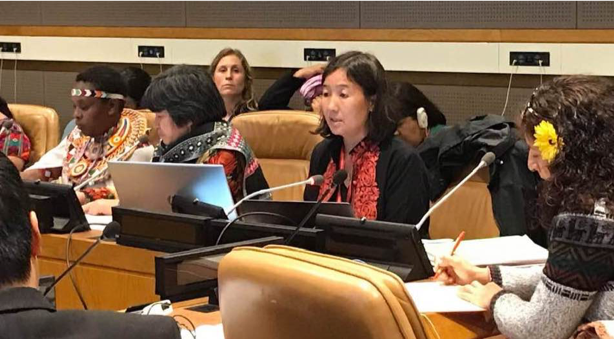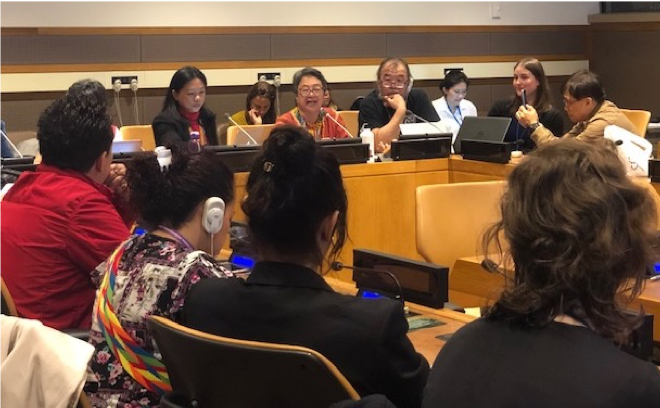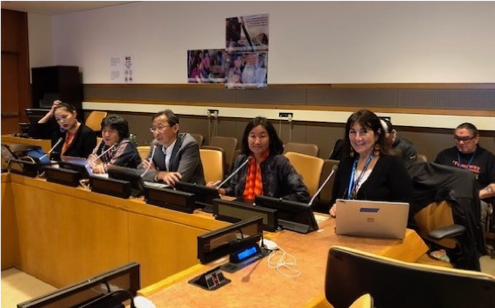Indigenous Peoples’ Struggle for Recognition of Traditional Knowledge & the UNPFII
CEESP News - by Pasang Dolma Sherpa, Co-Chair of CEESP Specialist Group on Indigenous Peoples, Customary & Environmental Laws & Human Rights
The United Nations Permanent Forum on Indigenous Issues (UNPFII) is a high- level advisory body to the UN Economic and Social Council. It was established in July 2000 by resolution 2000/22, with the mandate to deal with indigenous issues related to economic and social development, culture, the environment, education, health and human rights.

Photo: Vu Thi Hien
Pasang Dolma Sherpa speaking on the values of traditional knowledge and innovation. Photo credit: Vu Thi Hien
The theme of the United Nations Permanent Forum on Indigenous Issues (UNPFII) has been always the topic of my interest since I have been working closely on the issues and concerns of indigenous peoples in Nepal. The Forum has been one of the big achievements for indigenous peoples to express burning indigenous issues and concerns at the country level to be addressed.
However, not all interested individuals could join the forum though I believe those who are working on the theme should not miss this opportunity to share and learn from the experiences and stories of indigenous peoples from different regions of the world. This would better help to understand their own situation and join hands for the common cause with different solutions.
I was particularly interested to follow the theme, “traditional knowledge: generations, transmission and protection” during the 18th session of the UNPFIII in New York, looking at how different indigenous groups around the world have been struggling with modern development, government policies, and programs to promote and protect indigenous knowledge and cultural practices in their countries.
While listening to the different stories, I found that one of the commonalities was that despite the developed and developing countries, the stories of indigenous peoples remained the same - “no respect of indigenous peoples in their own land,” and that the struggle for recognition of their traditional knowledge and cultural practices continues in each country.
Throughout the struggles of indigenous elders at the international forum, the establishment of the UNPFII is the great platform for indigenous peoples to speak their burning concerns for respecting and recognizing their traditional knowledge and cultural practices to be addressed by the national laws, policies and regulations at home country. It was a great moment for indigenous peoples like myself working on the issues and concerns of indigenous peoples in relation to climate change, natural resources, environment and land tenure to share stories and experiences and join hands, how could we promote and save our remaining language, knowledge, culture and our traditional livelihood, as well as influence each of our concerned ministries so that the broken heart of indigenous communities could be healed and could hope for the continuity of speaking indigenous language and enjoyment of cultural practices by future generations.
 Photo: to Vu Thi Hien
Photo: to Vu Thi Hien
Left: Victoria Tauli Corpuz, special rapporteur on the rights of indigenous peoples, is addressing and preventing criminalization and impunity against indigenous peoples
During the forum, I shared my stories as one of the panelists during the side events of Pawanka Fund (organized jointly by AIPP, TEBTEBBA, Samburu- Women Trust, Totimiya and FIMI) which explored the theme of traditional knowledge and indigenous peoples’ innovations for sustainable natural resource management.
On the topic of indigenous peoples in Asia, I could share cases from Nepal's Dura communities in Lamjung District and Lama communities in Nubri, Kutan and Tsum villages in Gorkha district in Nepal, how they have been continuing their cultural practices and self-governance systems of regulating and protecting their natural resources, despite not being supported and promoted by the legal provisions in Nepal.
 Photo: Vu Thi Hien
Photo: Vu Thi Hien
During another side event on Sustainable Development Goals (SDGs), Climate Change and Traditional Knowledge: Updates from the High-level Political Forum (HLPF), Global Landscape Forum (GLF), and the FWG on the LCIP - organized by Indigenous Peoples Major Group on Sustainable Development (IPMG), International Indian Treaty Council, I started my presentation on the recognition of the values of traditional knowledge by the United Nations Framework Convention on Climate Change (UNFCCC) and willing to exchange the stories, how indigenous peoples have been contributing for climate change resilience by bringing on the same platform in the decision making process at the global level and necessary of bringing changes at the national level too.
Apart from joining the plenary discussion and panelists in two of the side events, I found UNPFII helpful to catch up the aspiration of indigenous elders, leaders and activists, as well as meetings and interacting bilateral and multilateral agencies that have been working on the concerns of indigenous peoples around the world. I found the forum has been a very significant platform to follow up; those who are working on the issues and concerns of indigenous peoples should not miss it.
 Photo: Pasang Dolma Sherpa
Photo: Pasang Dolma Sherpa
Pasang Dolma Sherpa serves as the executive director of the Center for Indigenous Peoples' Research and Development (CIPRED) and holds a Ph.D. from Kathmandu University.
She is a co-chair of the IUCN CEESP Specialist Group on Indigenous Peoples, Customary and Environmental Law and Human Rights (SPICEH).
